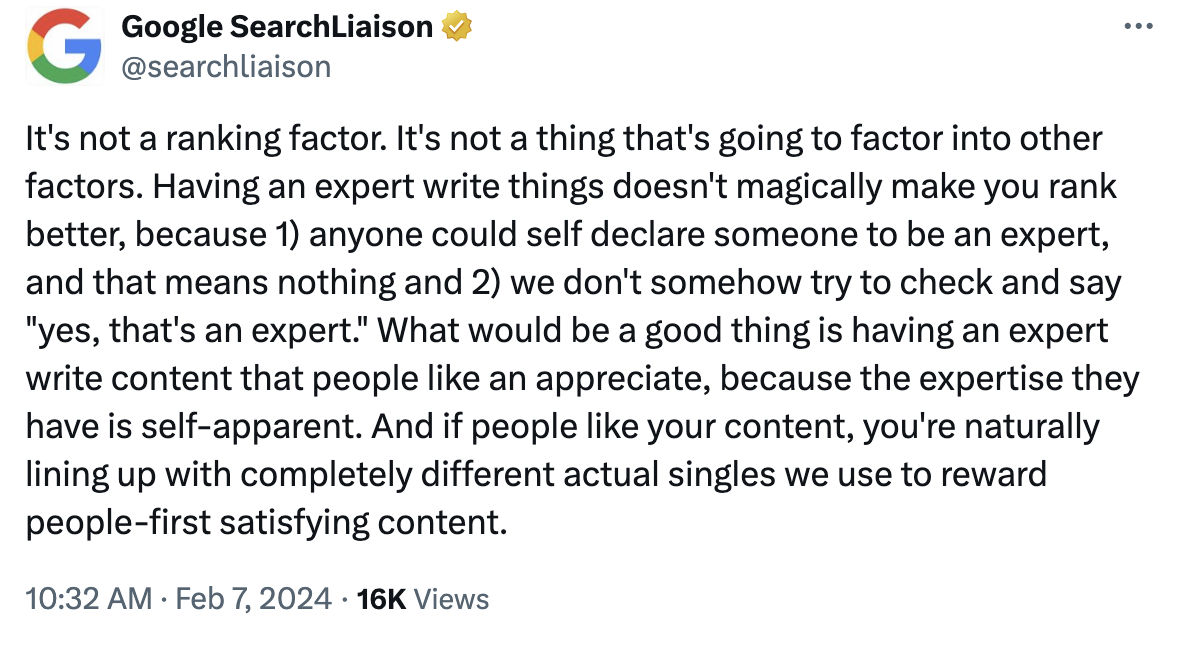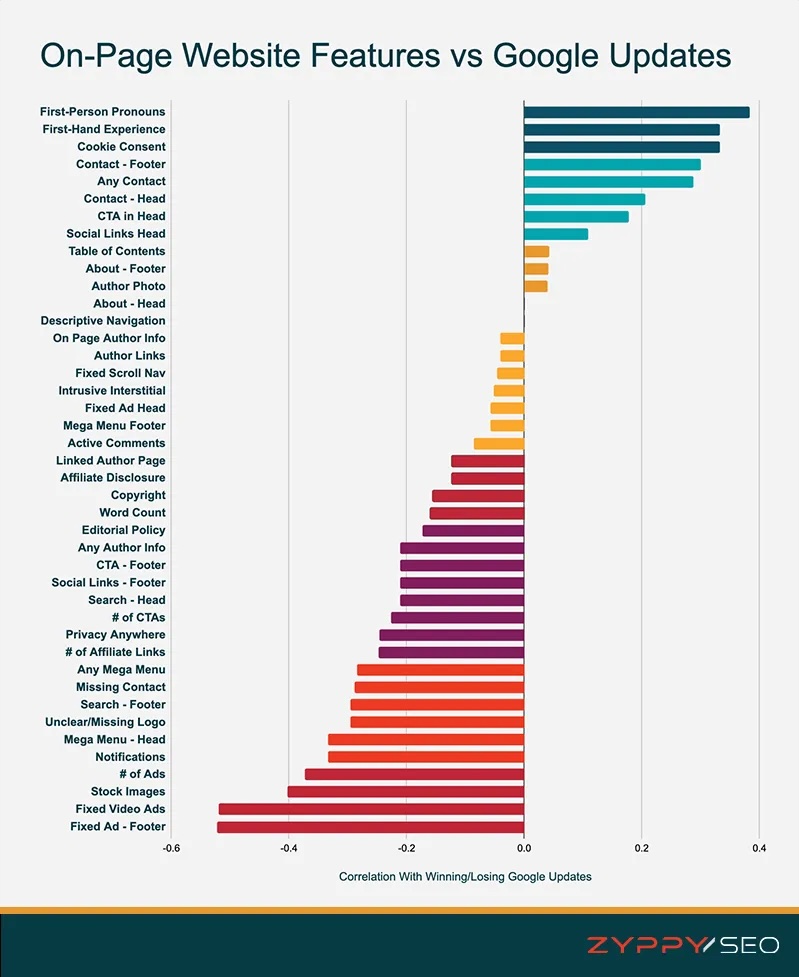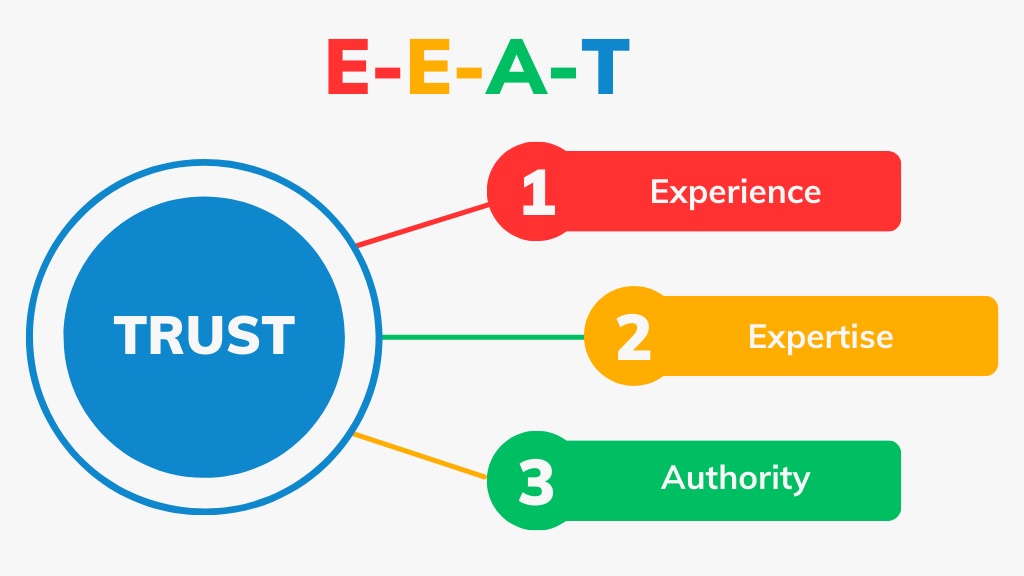This is a recurring topic within the SEO community and one that often results in heated debates. Some say that EEAT (Experience, Expertise, Authority, Trust) is a ranking factor, and others point to Tweets like the one below to show that EEAT is not a ranking factor.

When EAT, now EEAT, became a thing, people tried to game it. Like SEOs often do.
One of the biggest tactics I’ve seen around this in the last couple of years is prominently displaying expertise on the site by way of name-dropping or adding author bios on blog posts. If a business doesn’t have an expert on staff, they might hire a freelancer with nice credentials, or they might pay a doctor to “peer review” content before it’s published, just to be able to use that expert’s name on the page. Some people have even tried faking their expertise or they’ve used well-known experts in bios without their permission.
And in a lot of these cases, the end result is that it didn’t change anything. I hear people saying, “I added an expert to my site, and nothing happened! EEAT isn’t a ranking factor!”
Okay, yeah, maybe EEAT, as a whole, isn’t a ranking factor. But that doesn’t mean that parts of it are not ranking factors. Or that EEAT can’t influence ranking factors.
I believe Google is telling the truth that EEAT is not a ranking factor, but I also believe that they’re not being fully transparent in their answer. There are a lot of things they’re not saying when they talk about EEAT.
When you put all of the pieces together, including the pieces that exist outside of EEAT, you can better understand how EEAT might work to help your rankings.
Google says to use EEAT as a guide when creating content so that your content helps your users – not to influence your rankings. I believe that if you keep the EEAT guidelines in mind while improving your site, you’ll end up doing things that can assist SEO efforts.
You can read Google’s Search Rater Guidelines here. Marie Haynes also has a very in-depth page about EEAT if you want to dig into her thoughts on the guidelines. She also keeps it updated so it’s always a good resource to refer back to.
Information Gain and EEAT
The late great Bill Slawski introduced the SEO community to the concept of “Information Gain,” which is a patent filed by Google. Information gain starts with the idea that there are lots of pages on the internet that all have the same content. You could read 10 articles on the same topic on 10 different websites and not learn anything new beyond the first article you read. But when a page has something different than the others, its information gain score goes up.
Information Gain is where I believe EEAT plays a big role. A real expert will have far more to say than the same old regurgitated article everyone else is writing (or that AI is writing). An expert is able to increase the Information Gain score of a page simply because they have real-life expertise or experience to add.
Another benefit of creating content with EEAT and Information Gain in mind is that it’s just naturally going to be better. It’ll be useful. And when you have that type of content, people share it and link to it. Those links are going to benefit your SEO.
How EEAT Played a Role In Algorithm Updates Last Year
Cyrus Shepard also just recently published a study he did on sites that either lost or gained significant traffic during the big algorithm updates that happened in the the last half of last year. He identified the on-page features that those websites have that correlate to their traffic changes.

The features that Cyrus looked at are related to things that contribute to EEAT.
In Cyrus’ study, features with strong correlations to traffic gain on the winning sites were first-person pronouns (I, we, me, us, etc), first-hand experience, contact information, and other signals of trust.
On a side note here; using first-person pronouns is another one of those things people took from EEAT and tried to use as an SEO tactic. But people are lazily plugging it into the content without thinking about why first-person pronouns would matter. When someone uses a first-person pronoun, they are usually talking about their experience with something. That’s where you start to create unique content (and information gain).
Features with a strong correlation to a loss of traffic are fixed ads (video and image), a high number of ads, stock images, missing or obscure contact info, and browser notifications. You can connect these things to various ranking factors, like slow page performance, a bad user experience, and a lack of unique content. These sites also likely have a poor backlink profile because nobody wants to link to spammy or untrustworthy sites. A lot of these things annoy site visitors and cause them to leave your site, which can lead to pogo-sticking, which is when someone lands on a page and quickly jumps back to the search results. And that’s also believed to be a small ranking factor.
EEAT Isn’t a Ranking Factor, But It Can Help You Rank
While EEAT as a whole isn’t a ranking factor, by using EEAT as a guide when improving your site, you can hit on a lot of those things that do impact rankings. You can also increase the Information Gain score of your content. Whether or not EEAT helps rankings, it helps your customers, which is good for conversions and for how people feel about your business.

